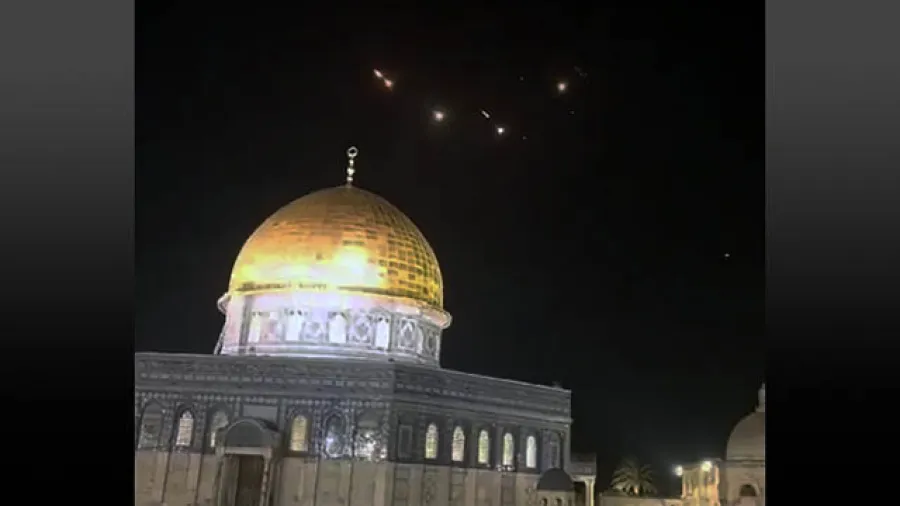The silence of the Palestinian leadership in the face of the Iranian missile attack on Israel is further proof that the Palestine Liberation Organization (PLO) is again aligning itself with the enemies of Israel and the West. Even as Israel was joined by an international coalition, including the United States, the United Kingdom, Jordan, and others, to repel the attack, the Palestinian leadership chose to remain quiet. There was no condemnation of the attack that could have just as easily killed Palestinians as it could Jews. There was even no condemnation of the missiles fired toward Jerusalem and the Temple Mount.
In 1991, when Saddam Hussein invaded Kuwait and attacked Israel, Yasser Arafat and the PLO cheered him on. Initially, the result was disastrous for the Palestinian cause. The PLO had reinforced its image as a terrorist organization, and Yasser Arafat became an international pariah. In the aftermath, when Kuwait was liberated, the Kuwaitis expelled hundreds of thousands of Palestinians. Then, deus ex machina, along came Ron Pundak, Yair Hirschfeld, Yossi Beilin, and their patron, Shimon Peres, to pull the terrorists from the depths of despair with their new Oslo process.
The PLO was meant to renounce terror and accept Israel’s right to exist. But in truth, having been thrown a lifeline, the PLO leadership used the Oslo Accords as a means to establish a forward beachhead west of the Jordan River from which they would continue their terror attacks.
Warring Sunni and Shiite Islam Unite on One Thing
Within Islam, the Sunnis and the Shiites have been killing each other for 1,400 years. But when it came to the destruction of Israel, even these fundamental gaps were bridged when the Shiite Ayatollahs adopted the deceptive approach of the Sunni PLO.
One of the most significant expressions of that partnership was the 2002 Karine A affair, a ship full of weapons intercepted by the IDF. At the time, the PLO and the PA were at the height of the terror war initiated by Arafat after he rejected the Clinton-Barak peace deal. To wage the war, the Palestinians needed weapons. Arafat sent his long-time confidant, Fouad Shubaki, to Tehran to secure support. The Iranians donated 50 tons of weapons. All Arafat had to do was purchase the ship – the Karine A – to transport the arsenal. When IDF commandoes boarded the ship in the Red Sea, the Ramallah-Tehran connection was exposed for all to see.

In 2014, the IDF intercepted yet another huge Iranian shipment of arms and two million kilograms of cement on board the Klos-C, this time destined for Hamas in Gaza.


October 7 Alliance of Terror
Fast forward to the October 7, 2023, massacre when Hamas terrorists from Gaza launched the deadliest assault on the Jewish people since the Holocaust. Terrorists belonging to PA Chairman’s Fatah were also involved in the October 7 attack, as shown in this screen grab from the attack on Kibbutz Nahal Oz. Note the yellow Fatah headband.

Israel responded with crushing force not only in Gaza but also against the resurgent Palestinian terrorists in Judea and Samaria. Iran responded by activating its proxies in Lebanon (Hizbullah) and Yemen (the Houthis), attacking Israel from the north and the south.
As the fighting raged on different fronts, in March 2024, the IDF intercepted yet another substantial Iranian weapons cache destined for the Fatah – i.e., PLO/PA – terrorists in Judea and Samaria. Officials affiliated with Iran’s Islamic Revolutionary Guard Corps, linked to the Quds Force in Syria, were the masterminds of the operation.
Shortly after, Israel targeted and killed the IRGC Quds Force commander, Mohammad Reza Zahedi, who was reportedly responsible for the unit’s operations in Syria and Lebanon. Glorifying their dead commander, a mouthpiece for the Iranian regime added that Zahedi had been involved in the planning and execution of the October 7 massacre.1
In response to the assassination, on the evening of April 13, Iran launched an unprecedented attack, firing 185 drones, 36 cruise missiles and 110 surface-to-surface missiles at Israel.
The Iranian attack put the PLO/PA in an awkward position.
On the one hand, the longstanding PLO/PA/Hamas relationship with the Iranian Ayatollahs, who have devotedly supplied the terrorists with weapons and training, meant that the PLO/PA leadership would not join the international coalition fighting the Iranian axis of terror for fear of annoying their terror patrons.
On the other hand, the PLO/PA is trying to prove (without any factual basis) that it has embarked on the revitalization process required by the Biden administration.
While the PLO/PA wants to enjoy U.S. legitimacy, the fact of the matter is that they support the Iranian aggression. The PLO/PA, on this issue, is no different from Hamas and the other Palestinian terror groups, all of whom, like Iran, seek Israel’s destruction.
As in the first Gulf War, the Iranian attack should be a watershed moment for the PLO/PA. Either the Palestinian leadership stands with the international coalition, or it stands with the axis of evil. There is no middle ground. In the same way, as the PLO/PA has never condemned the October 7 massacre, the PLO/PA’s failure to condemn the Iranian attack is not indicative of indifference but instead of real, palpable support that should carry real consequences.
The writer is the Director of the Initiative for Palestinian Authority Accountability and Reform in the Jerusalem Center for Public Affairs and served for 19 years in the IDF Military Advocate-General Corps. In his last position, he served as director of the Military Prosecution in Judea and Samaria.
Note
- https://jcpa.org.il/article/%d7%9e%d7%9b%d7%95%d7%9f-%d7%9e%d7%97%d7%a7%d7%a8-%d7%94%d7%91%d7%9b%d7%99%d7%a8-%d7%94%d7%90%d7%99%d7%a8%d7%90%d7%a0%d7%99-%d7%a9%d7%97%d7%95%d7%a1%d7%9c-%d7%91%d7%93%d7%9e%d7%a9%d7%a7-%d7%94%d7%99/↩︎









